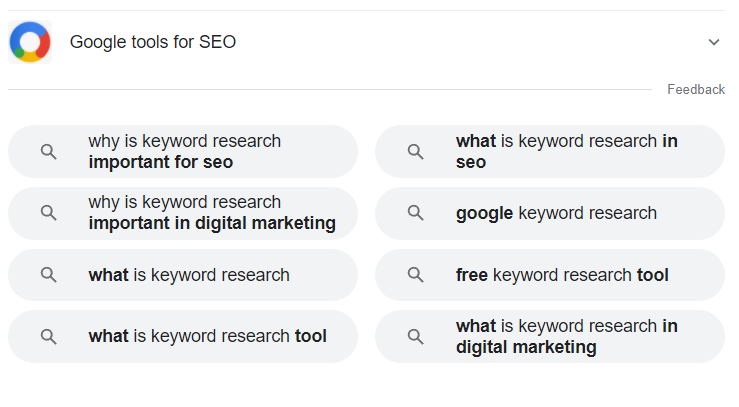Keyword research is a practice of search engine optimization that is used to find and analyze the search terms (words or phrases) that users enter into a search engine when looking for products & services or other information. It is essential to know that keyword research can reveal queries to target, the popularity of these queries, their ranking difficulty, and so on.
The importance of keyword research
As mentioned earlier, keyword research provides valuable insight into actual search terms that can help you with your marketing strategy. Learning how to do keyword research is an essential SEO task for every blogger and digital marketer. You can identify popular terms that people are actively looking for on Google (or other search engines) and focus your content mostly on those topics through keyword research. So, by choosing the correct terms and phrases to target on your website, you can eventually increase organic search visibility, rankings, and traffic.
Here are the main benefits of conducting keyword research:
1.Marketing trend insights
Keyword research can provide you with insights into actual marketing trends, and in this way, you can focus on relevant topics and keywords the audience is in search of.
2.Traffic growth
Keyword research helps you identify the best-fitting keywords for the content you publish on your website. In this way, you will rank higher in search engine results, driving more traffic to your site.
3.Customer acquisition
If your business has relevant content for other business professionals and you can offer them what they are looking for, you can provide them with a call to action that will point them to purchase.
4.Keywords vs. topics
As you discovered, keyword research informs you which topics people are looking for the most and how popular these topics are among your current audience. After doing that, you will get a high volume of searches per month, and then it can be easier for you to sort your content into topics that you want to create content on. Again, these topics will help you dictate which keywords you look for and target.
Elements of keyword research
Here are three main elements to consider when conducting keyword research:
-Relevance
Keep in mind that Google ranks content for relevance, so your content will only rank for a keyword if it meets customers’ needs. So, you have to ensure that your content is the best resource out there for the query.
-Authority
Another thing you may already know is that Google provides more weight to sources it deems authoritative. So, you have to become an authoritative source and enrich your website with helpful information and relevant content to have a higher chance of ranking.
-Volume
Ending up on the first page for a specific keyword means nothing if no one ever searches for it. This is where the idea of volume comes in. Volume is measured by MSV, which means monthly search volume and displays how many times the keyword is searched for one month across all audiences.
How can you research keywords for your SEO strategy?
Here is a step-by-step guide on establishing a solid keyword strategy and finding a list of terms you should be targeting.
1.Make a list of relevant topics that are adequate for your business.
Take your time and think about the topics you consider essential to your business, and then use these topic buckets to find some specific keywords related.
For example, if you are selling marketing software, you must have these kinds of topics:
- “Inbound marketing” (21K)
- “Blogging” (19K)
- “Email marketing” (30K)
- “SEO” (214K)
- “Social media marketing” (71K)
- “Marketing analytics” (6.2K)
- “Marketing automation” (8.5K)
The numbers in parentheses signify the monthly search volume of each keyword above.
2.Fill in those topic buckets with keywords.
Once you find a few topic buckets, you have to identify some keywords that fall into those buckets. These keywords should represent specific terms your target customers have searched the most on Google. For example, if you see that the last topic bucket for an inbound marketing software company is “marketing automation,” here are other keyword phrases you will think people would type in:
- marketing automation tools
- how to use marketing automation software
- what is marketing automation?
- how to tell if I need a marketing automation software
- lead nurturing
- email marketing automation
- top automation tools
However, this probably won’t be your final list of keyword phrases. Still, they most likely represent what your potential customers might use to search for content related to that specific topic bucket.
Another unique and intelligent way to come up with valuable keyword ideas is to identify the keywords that are helping your website to get found. Google Analytics and HubSpot’s Sources report are website analytics software (available in the Traffic Analytics tool)that can help you with that. Discover your website’s traffic sources and explore your organic search traffic bucket to determine which keywords customers use to reach your site.
3.Realize how intent affects keyword research & analyze properly
User intent is now a central factor in your ability to rank as high as possible on Google or other search engines. Providing relevant information that matches users’ search intent (search query) helps your website gain authority, which is essential to your ranking potential. Keywords can have many unlike meanings beneath the surface, so you need to be very careful about the way you interpret the target keywords. So, to verify the actual user’s intent in a particular keyword, enter this keyword into a search engine and stand by for the results to come up. Once you understand the user’s intent, make sure the type of content Google is related to what you will create for that keyword.
4.Research-related search terms

Research-related search terms 29.03.2022
If you have difficulty thinking about more keywords people might be searching about a specific topic, check for the related search terms when you search for a keyword phrase on Google (or any other search engine). Once you type in your expression, you will notice some suggestions related to your search at the bottom of Google’s results. Use these keywords to generate ideas for other keywords or type in some of those related search terms and find out their related search terms.
5.Use keyword research tools to your advantage.
You can use Keyword research and SEO tools to your utility as they can help you develop more relevant keyword ideas that match the ideas you’ve already generated. Here are some of the most popular SEO tools that you can use:
- Ahrefs
- SEMrush
- Moz
- Ubersuggest
- Google Keyword Planner
- KWFinder
- SECockpit
- KeywordTool.io
- Keywords Everywhere
Ensure to re-evaluate your keywords every few months and add more keywords to your list to maintain your current presence and grow your website.
If you have any questions, you are welcome to contact us: [email protected]




